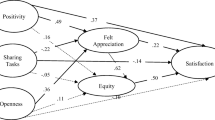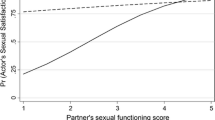Abstract
The relative effects of equity, equality, and reward level upon assessments of marital satisfaction are investigated. In doing so, the impact of gender-role orientation upon the relationship between the predictor variables and marital satisfaction is specified. The data indicate that reward level is the major variable affecting assessments of satisfaction for both moderns and traditionals. Further, the effect of reward level is more pronounced for those with modern gender-role orientations. Contrary to expectation, the effects of the exchange-related variables, equity and equality, are minimal for both moderns and traditionals. These findings suggest that intimates, regardless of gender-role orientation, tend to avoid the “bookkeeping” involved in global equity and equality comparisons and instead accentuate individual reward levels. It appears, however, that moderns are significantly more demanding than traditionals in their emphasis upon reward levels.
Similar content being viewed by others
References
Adams, J. S. Inequality in social exchange. In L. Berkowitz (Ed.), Advances in experimental social psychology (Vol. 2). New York: Academic Press, 1965.
Blood, R. O., & Wolfe, D. M. Husbands and wives. New York: Free Press, 1960.
Brogan, D., & Kutner, N. G. Measuring sex role orientation. Journal of Marriage and the Family, 1976, 38, 31–40.
Burgess, R. L., & Nielsen, J. An experimental analysis of some structural determinants of equitable and inequitable exchange relationships. American Sociological Review, 1974, 39, 427–433.
Cate, R. M., Lloyd, S. A., Henton, J. M., & Larson, J. M. Fairness and reward level as predictors of relationship satisfaction. Social Psychology Quarterly, 1982, 45, 177–181.
Deutsch, M. Equity, equality and need: What determines which will be used as the basis of distributive justice. Journal of Social Issues, 1975, 31, 137–149.
Foa, U. G., Foa, E. B. Societal structures of the mind. Springfield, IL: Charles C Thomas, 1974.
Homans, G. C. Social behavior: Its elementary forms. New York: Harcourt, Brace and World, 1961.
Huston, T. L., & Burgess, R. L. Social exchange in developing relationships: An overview. In R. L. Burgess & T. L. Huston (Eds.), Social exchange in developing relationships. New York: Academic Press, 1979.
Jasso, G. A new theory of distributive justice. American Sociological Review, 1980, 45, 3–32.
Kerlinger, R. N., & Pedhazur, F. J. Multiple regression in behavioral research. New York: Holt, Rhinehart and Winston, 1973.
McDonald, G. W. Structural exchange and marital interaction. Journal of Marriage and the Family, 1981, 43, 825–839.
Safilios-Rothschild, C. A macro- and micro-examination of family power and love: An exchange model. Journal of Marriage and the Family, 1976, 38, 355–362.
Sampson, E. E. On justice as equality. Journal of Social Issues, 1975, 31, 45–64.
Sampson, E. E. Psychology and the American Ideal. Journal of Personality and Social Psychology, 1977, 35, 767–782.
Scanzoni, J. Social processes and power in families. In W. Burr, R. Hill, F. Nye, & I. Reiss (Eds.), Contemporary theories about the family: Research-based theories (Vol. 1). New York: Free Press, 1979.
Schwartz, B. The social psychology of the gift. American Journal of Sociology, 1967, 73, 1–11.
Sharpley, C. F., & Cross, D. G. A psychometric evaluation of the Spanier dyadic adjustment scale. Journal of Marriage and the Family, 1982, 44, 739–741.
Spanier, G. B. Measuring dyadic adjustment: New scales for assessing the quality of marriage and similar dyads. Journal of Marriage and the Family, 1976, 38, 15–38.
Walster, G. W. The Walster et al. (1973) equity formula: A correction. Representative Research, 1975, 6, 63–64.
Walster, E., Berscheid, E., & Walster, G. W. New directions in equity research. Journal of Personality and Social Psychology, 1973, 25, 151–176.
Walster, E., Walster, G. W., & Berscheid, E. Equity: Theory and research. Boston: Allyn & Bacon, 1978.
Walster, E., Walster, G. W., & Traupmann, J. Equity and premarital sex. Journal of Personality and Social Psychology, 1978, 36, 82–92.
Author information
Authors and Affiliations
Additional information
I thank Gary Hansen for his assistance in the collection of the data for this study.
Rights and permissions
About this article
Cite this article
Martin, M.W. Satisfaction with intimate exchange: Gender-role differences and the impact of equity, equality, and rewards. Sex Roles 13, 597–605 (1985). https://doi.org/10.1007/BF00287297
Issue Date:
DOI: https://doi.org/10.1007/BF00287297




